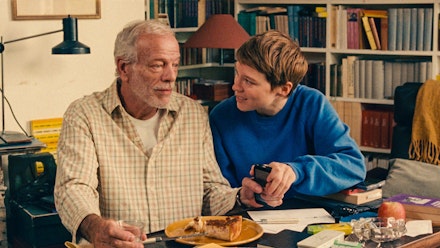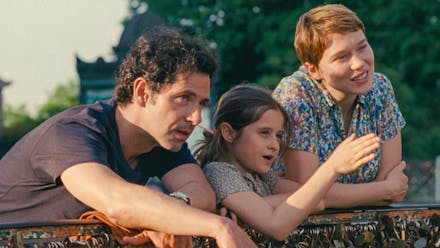One Fine Morning once again confirms Mia Hansen-Løve’s position as a movie alchemist. She takes the stuff of everyday life — work, family, relationships, illness, raising children — and mines it for magic without ever feeling trite or inauthentic. Built around a career best performance by Léa Seydoux, it’s a portrait of a woman experiencing extremes — the joy and exhilaration of new love, the pain and helplessness of a rapidlydeteriorating father — simultaneously. In outline, it sounds histrionic; in actuality it’s a beautifully drawn gift of a film, full of grace notes while emerging as a completely satisfying whole.

There is an unhurried effortlessness about Hansen-Løve’s storytelling as she weaves together the different strands of Sandra’s life. Early doors, the film doubles down on her work as a translator (tellingly an invisible mediator for others) and her role as a dutiful daughter to Georg (a perfectly understated Gregory), her philosophy lecturer father whose memory and eyesight are slowly ebbing away due to a rare form of dementia. Hansen-Løve dramatises the heart-breaking conundrums of dealing with elderly parents, both practical (finding decent care at an affordable price) and emotional: when Sandra, clearing out his library, observes, “I feel closer to my father with his books than with him”, it’s a tacit conflation of her memory of who he used to be syringed with her sadness about who he has become.
Hansen-Løve’s filmmaking is unshowy but always elegant, with intelligent use of ellipsis and repetition.
Given all the sadness and responsibility Sandra is burdened with (she also has to sit through violent kids’ films with her daughter, who later hilariously feigns a limp), it is a punch-the-air moment when she finds a scrap of happiness with married cosmo-chemist Clément, charmingly played by Poupaud. It’s an archetypal French Movie Affair — big conversations, walks in pretty parks, rumpy-pumpy, great haircuts — but both director and actors find humanity in the familiar scenario. Seydoux is radiant as a woman tentatively rediscovering her body (“I’ve forgotten how,” Sandra says mid-seduction) and herself, while Poupard winningly plays against the Gallic lothario stereotype, as happy to spend time with Sandra in a museum as in the sack.
Hansen-Løve’s filmmaking is unshowy but always elegant, with intelligent use of ellipsis and repetition. It’s a personal film but not a navel-gazey one, full of humour and warmth (there’s a Christmas family scene that does nothing to advance the plot but is an all-timer). It does that Hansen-Løve trick of being serious and light all at once, a return to the complex realities of her best work (see Goodbye First Love, Father Of My Children, Eden, Things To Come). And when it comes to wrap things up, few filmmakers leave you with a sense that life is carrying on long after the end credits roll.
